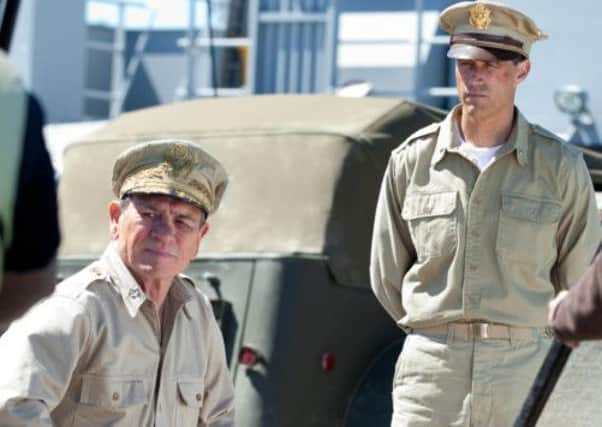Picking up pieces after darkness descended on Land of the Rising Sun


And top of the heap amongst the brass was General Douglas MacArthur who found himself acting as the de facto leader of a country rooted in unfamiliar traditions and customs.
For Peter Webber, director of Emperor, the screenplay by David Klass and Vera Blasi presented a number of intriguing opportunities, not least the chance to lay bare the man who was MacArthur.
Advertisement
Hide AdAdvertisement
Hide AdWebber pursued and landed a very big fish to play MacArthur: Tommy Lee Jones.
For the actor the attraction was in unravelling this larger-than-life military man who, to many people, seemed certain to run for President.
For Webber it was about highlighting a man who was as vainglorious and egotistical as he was charismatic and smart.
“Heroes have feet of clay,” says Webber.
“I worked very closely with Tommy who wanted to give the character some depth. He didn’t just want to play a straightforward historical character and so we started trying to tailor the role to him.
“Some days I’m quite smart, some days I’m an idiot.
Advertisement
Hide AdAdvertisement
Hide Ad“Some days I do things that are really wise decisions, some days I make stupid mistakes. Historical characters can be like that as well; it makes them feel more real.
“There’s no doubt that MacArthur was aiming to stand for election and if you have a look, Eisenhower won. He was a general in the war and he won the nomination. So MacArthur might have done it.
“If you look at the amount of photos there are of him you can see from very early days that he was managing his media representation very closely. So I really do feel we captured the spirit of the man.”
Emperor is also very sympathetic towards the Japanese. It strikes a crucial balance between perceived American Imperialism and the need for vengeance and painting a portrait of a nation on its knees, defeated and shamed. Some might even call it an apologia for Japan’s behaviour in the war.
Advertisement
Hide AdAdvertisement
Hide AdWebber denies such suggestions and claims the film clearly references that the manner in which Japan waged war led to “horrendous war crimes [that were] frankly shocking and barbaric especially to western eyes”.
He adds: “What it does is help you understand some of the history from the Japanese point of view. And it does take two to tango.
“If you put to one side – and I’m not excusing it – the Japanese barbarity during the war and begin to look at what was happening in the 30s in the Pacific theatre then you see a slightly different story which is about two empires bashing up against each other.
“That’s not an excuse for what happened at Pearl Harbor but context is very important in understanding why was it that the Japanese felt they had to prosecute that war in the first place. To understand a bit more history would get you inside their heads.
Advertisement
Hide AdAdvertisement
Hide Ad“There is a debate about the dropping of the atomic bomb. Some people say it was needless and unnecessary; there are many veterans who think it was absolutely the right thing to do because it saved all of their lives.
“So I think there are some moral and historical live debates. I wouldn’t say that it was an apologia as much as it’s a more even-handed view of history.”
Emperor (12A) is on general release.